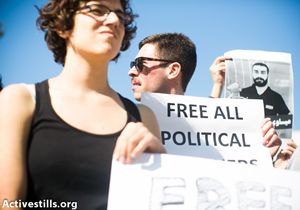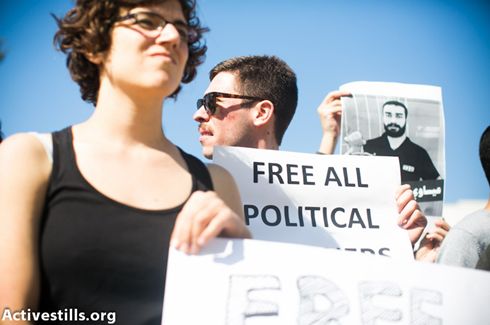
Israel may allow an international organization to examine the results of the autopsy performed on Palestinian detainee Arafat Jaradat, who died in Megiddo Prison on Saturday, said Public Security Minister Yitzhak Aharonovitch on Wednesday. Israeli officials initially said that Jaradat died of a heart attack, but a Palestinian doctor present during the autopsy claimed his death was the result of torture. The minister was responding to questions from members of Knesset about Jaradat’s death as well as the state of other Palestinian prisoners.
Balad party leader MK Jamal Zahalka asked the minister about the circumstances of Jaradat’s death and whether Israel was prepared to allow an international investigation. “The discrepancies between the various reports are a cause for alarm and there is the need for an unequivocal answer as to what actually happened and why there are discrepancies between the reports of the different pathologists,” said Hadash MK Dov Khenin, who also questioned the functioning of the prison wing in which detainees are questioned, asserting that excessive violence was being employed there. “The placement of a prisoner suffering from severe back pains in a position that did not allow any movement whatsoever must be investigated,” added Khenin, referring to Jaradat.

Protester holding a photo of Palestinian hunger striker Samer Issawi during a demonstration in solidarity with Palestinian hunger strikers held in Tel Aviv University on February 27, 2013 (Photo: Activestills)
The minister’s statements coincide with a call by UN special rapporteur for human rights in the Palestinian territories Richard Falk for an international inquiry into Jaradat’s death. “The death of a prisoner during interrogation is always a cause for concern, but in this case, when Israel has shown a pattern and practice of prisoner abuse, the need for outside, credible investigation is more urgent than ever,” said Falk, also an American law professor. Falk suggested the UN Human Rights Council might set up an international forensic team to investigate Jaradat’s death.
He said that the Palestinian doctor had found “clear signs of torture on the body of the previously healthy 30-year-old Jaradat. In light of Dr. Alul’s findings that there was no evidence of heart disease or damage, and that there were signs of torture on Jaradat’s body, an independent international investigation should be launched.”
Solidarity with Palestinian prisoners in Israel
Prison authorities transferred detainee Samer Issawi from Ramle prison to a hospital in Israel after 210 days on hunger strike, an Israeli official said late Wednesday. A spokeswoman for the Israel Prison Service, told Palestinian News Agency Ma’an that Issawi was taken to Kaplan medical center in Rehovot, but she said his condition was stable and the move was unrelated to any specific decline. Palestinian Authority prisoners minister Issa Qaraqe confirmed that Issawi had been hospitalized. “The Israeli side has begun dialogue today to find a solution to this issue, but so far they have not presented an acceptable offer,” Qaraqe told reporters in Ramallah, adding that Issawi and Ayman Sharawna had refused an offer to be freed and deported. Aside from a brief suspension in December, Sharawna has been on hunger strike since July. Issawi and Sharawna were rearrested after being granted amnesty in the Oct. 2011 prisoner swap agreement between Israel and Hamas.
200 students, lecturers and left activists protested on Wednesday afternoon at Tel-Aviv University in solidarity with the struggle of the Palestinian prisoners and those amongst them on hunger strike. The protesters waived signs reading, “Sleep deprivation = torture,” “Release political prisoners” and “Martial law is not law.” Some 20 extreme right-wing activists protested there as well. Holding Israeli flags they chanted, “Go to Gaza” and held signs reading, “Supporting administrative detainees = supporting terror, “The word ‘terrorist’ can be white-washed, their hands can’t be, either.”
A member of the Central Committee of the Communist Party, Noa Levy, an activist in the Lecturers Union who participated in the protest said “we came to protest in support of the Palestinian prisoners. Every third man in the occupied Palestinian territories is sitting in prison. My country is conquering one million people. Those on trial, are court martialed and being judged by soldiers – those same soldiers entering their villages by tank.” Levy said that “when your enemy is your judge, you cannot call it a fair trial. We see that evidence is missing and that it is impossible to defend yourself in court.”
A Hadash activist in the university Rajaa Natur, who arrived at the scene to protest, said that “this is an illegal act that shows the true face of the occupation. The prisoners have been sitting in jail for years upon years without knowing if this thing is going to end, that is oppression of sorts.” Hadash has held several protest rallies in Israel. Last Tuesday was held a massive rally in the city of Sakhnin with the participation of the Issawi’s family and Hadash members of the Knesset. On Friday will be held another rally at Emil Habibi square in Haifa.


